Key takeaways:
- Mining investments require a balance between profit generation and ethical responsibility, impacting communities and environments.
- Understanding profit in mining involves considering social upliftment alongside financial returns, making profits a reflection of responsible practices.
- Engaging local communities and incorporating their insights into investment strategies is essential for sustainable and responsible mining.
- Collaboration and cultural sensitivity strengthen community relations and lead to better investment outcomes in the mining sector.
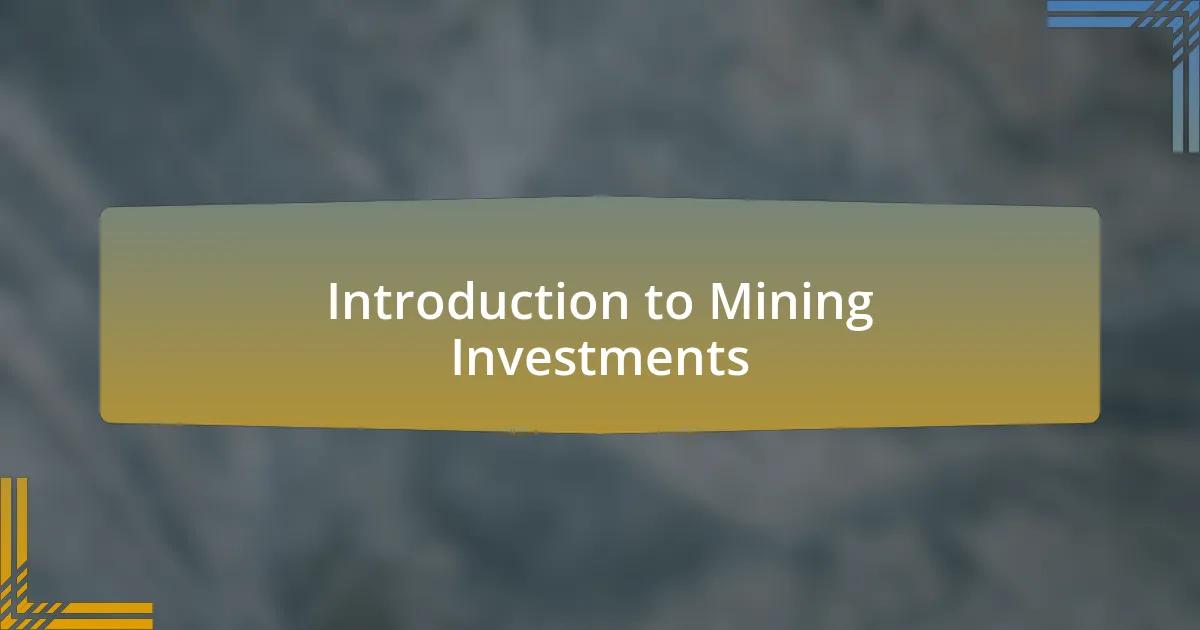
Introduction to Mining Investments
Mining investments represent a unique intersection of opportunity and responsibility. When I first entered this sector, I was drawn not just by the potential financial rewards but by the profound impact mining activities have on communities and environments. I often found myself pondering, can we truly strike a balance between profit generation and ethical responsibility?
As I navigated through various mining projects, it became clear that understanding the complexities of mining investments is crucial. They aren’t just about extracting minerals; they’re about the socio-economic dynamics of regions where these operations take place. Every decision I made was layered with the weight of its potential impact—financially, socially, and environmentally. How do we ensure that we build sustainable practices while still pursuing growth?
Moreover, I remember attending a conference where industry leaders discussed the importance of transparency and community engagement in mining investments. The mingling of personal stories about both successes and failures struck a chord with me. It made me realize that the journey of a mining investor is rich with lessons on responsibility, and it challenges us to think deeply about our role in the future of this vital industry. Are we, as investors, prepared to not only reap the benefits but also address the consequences of our actions?
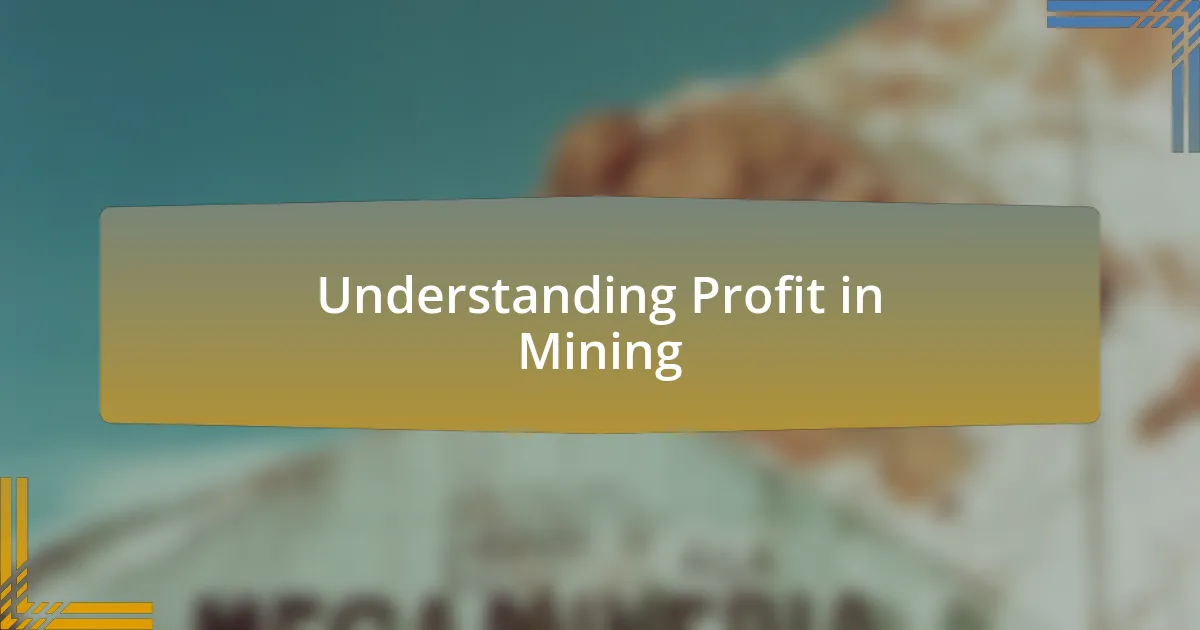
Understanding Profit in Mining
Understanding profit in mining goes far beyond just numbers on a balance sheet. I recall an instance when I sold shares in a mining company, feeling elated at the immediate return. However, that joy quickly turned into introspection when I learned about the environmental disruptions caused by some of their operations. It made me wonder—how can we measure profit when the costs extend to the communities and ecosystems affected?
In mining, profits can be substantial, but they come with inherent risks and responsibilities. I remember working on a project aimed at expanding mineral extraction while also investing in local infrastructure. The investment returns were promising, yet what struck me was how the community’s well-being became intertwined with our financial goals. It’s a constant reminder that profits are not just financial; they can also be seen in the social upliftment that responsible mining practices can engender.
It’s crucial to adopt a holistic view of profit in mining. When I consider long-term sustainability, I often reflect on the balance sheet of my decisions: Are we merely extracting resources, or are we also enriching lives? By emphasizing this duality, it becomes clear that profitability should align with ethical stewardship. After all, investing in mining can lead to wealth, but shouldn’t that wealth contribute to a thriving community as well?
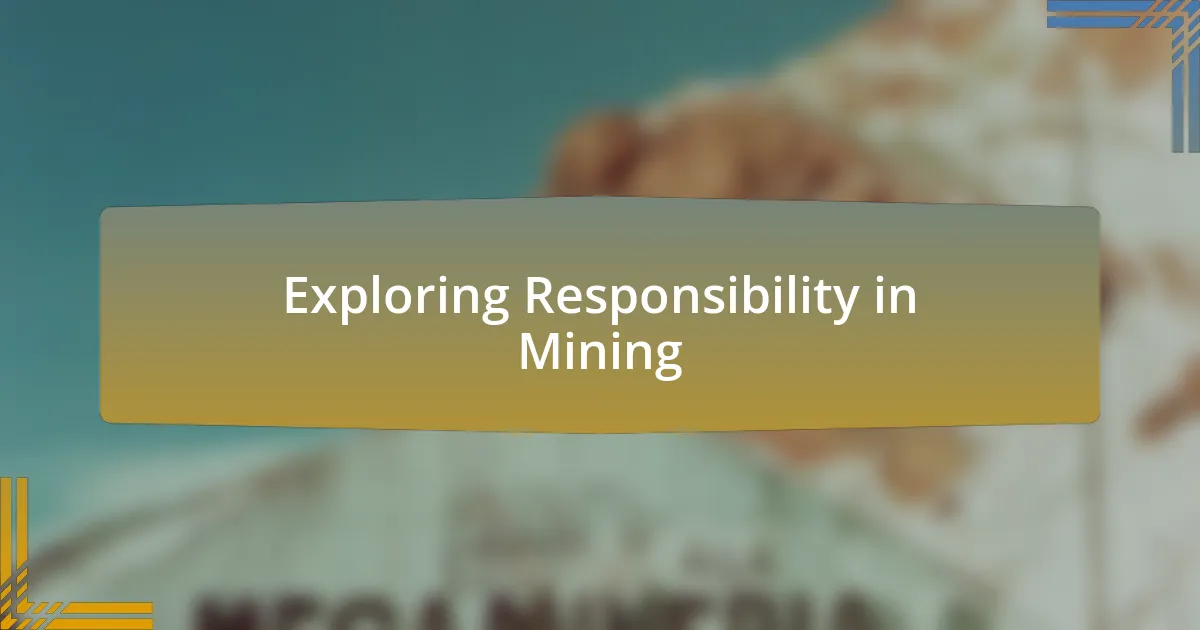
Exploring Responsibility in Mining
Exploring responsibility in mining requires a deep dive into how our actions affect people and the environment. I recall a time when I visited a nearby mining operation and saw the efforts made to rehabilitate lands after extraction. Witnessing the restoration efforts was poignant; it underscored that responsible mining is not merely about compliance—it’s about actively nurturing the earth and the communities we impact.
The ethical implications of mining often weigh heavily on me. I once attended a conference where local leaders shared their struggles with land displacement, and I couldn’t help but feel a pang of guilt. How could the pursuit of profit create so many collateral damages? This experience reinforced my belief that we have to listen to these voices and incorporate their needs into our investment strategies. After all, it’s not just about the minerals we mine but the lives we touch along the way.
Engaging in responsible mining presents a complex challenge but also an opportunity. I find myself often reflecting on the question: How can we pursue profit while honoring our commitments to social responsibility? An investment that prioritizes environmental stewardship and community engagement not only benefits our bottom line but creates a lasting legacy—something I strive for in every investment decision I make in the mining sector.
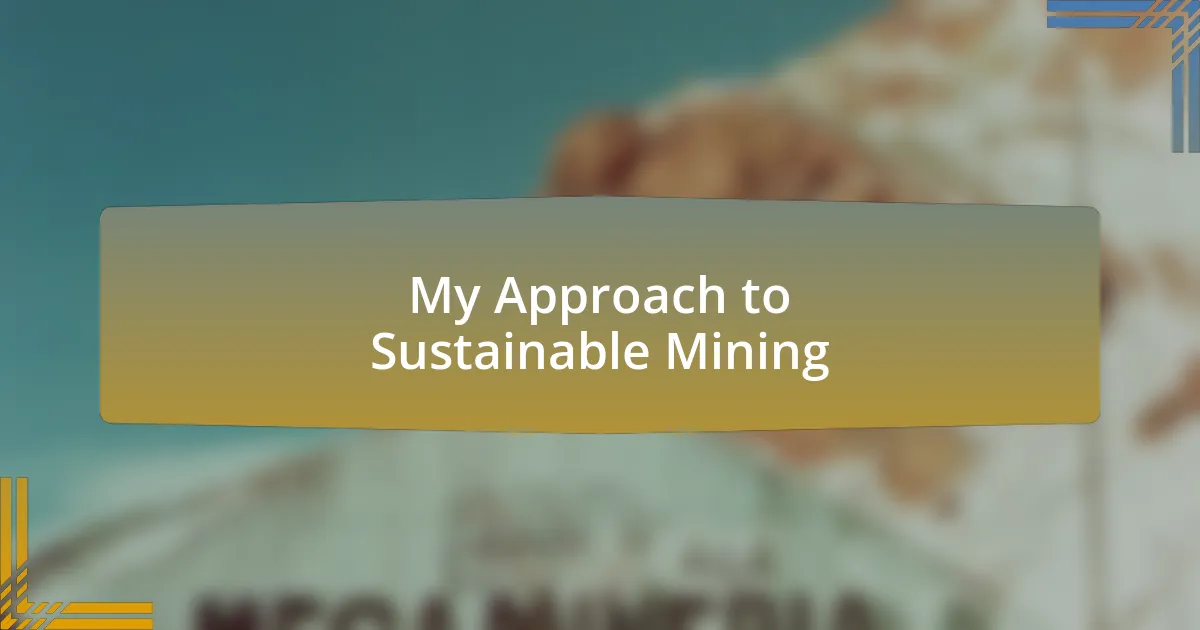
My Approach to Sustainable Mining
My approach to sustainable mining centers around collaboration and transparency. I vividly remember a meeting with local communities where we discussed potential mining projects. Their voices echoed with hope and skepticism; this showed me that fostering open dialogue is crucial for understanding their concerns. Who better to guide our efforts than those living closest to the land we seek to work on?
Balancing profit with responsibility requires innovative thinking. During a project review, I was struck by an idea to use sustainable energy sources on-site. This not only reduced operational costs but also demonstrated our commitment to minimizing the environmental footprint. Isn’t it fascinating how such solutions can bridge the gap between profitability and ethical responsibility?
My experiences have taught me that sustainable mining isn’t a destination but an ongoing journey. After implementing a community education program on mining impacts, I saw firsthand how knowledge empowers change. It made me realize that when we invest in people, we harvest more than just minerals; we lay the groundwork for resilient communities and eco-friendly operations that stand the test of time.
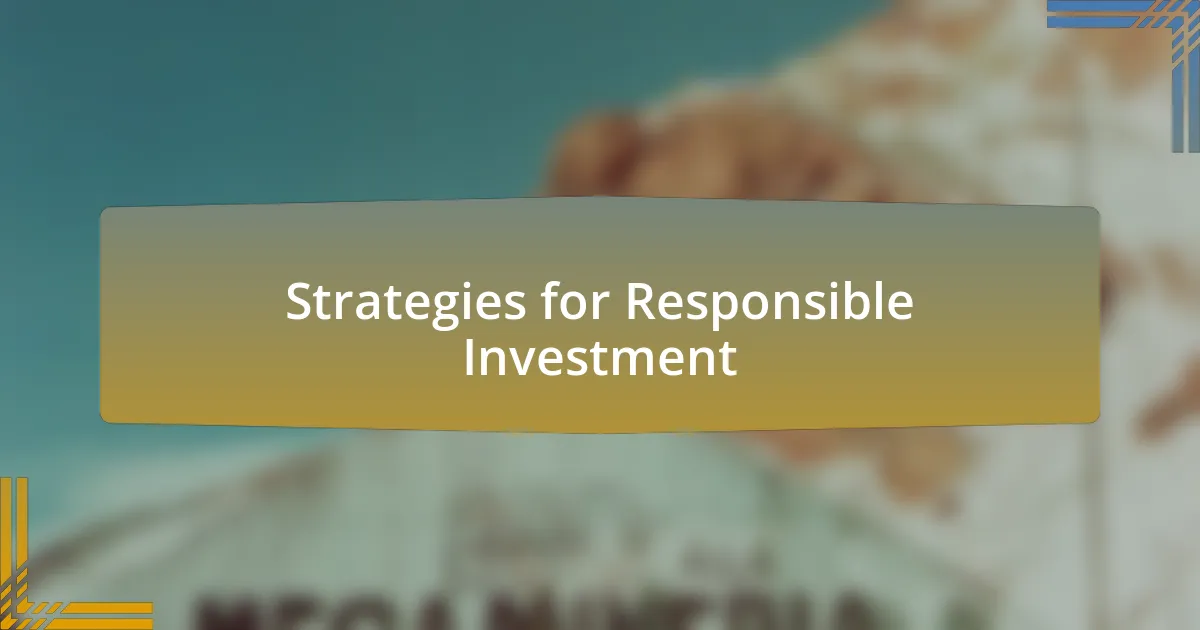
Strategies for Responsible Investment
Investing responsibly in mining requires a deep understanding of the local environment and community. I recall attending a workshop where stakeholders shared their insights about traditional practices. Hearing their stories made me appreciate the significance of integrating local knowledge into our investment strategies, ensuring that we don’t just extract resources but also uplift the very fabric of the community.
One effective strategy I’ve found is prioritizing companies that adhere to strong environmental and social governance (ESG) criteria. For instance, during a financial review, I shifted my focus toward firms that actively engaged in reforestation and waste reduction. The positive impact of these practices not only enhanced the companies’ reputations but also reflected a commitment to future sustainability. Isn’t it uplifting to see how profitability can align with ethical practices?
Additionally, I’ve seen the merits of engaging in impact assessments before initiating any project. Before we began operations in a new region, we conducted extensive research to determine potential environmental and social impacts. This proactive approach not only minimized risks but also built trust with the local community. When we prioritize transparency and accountability, it paves the way for investments that are not just financially sound but morally grounded.
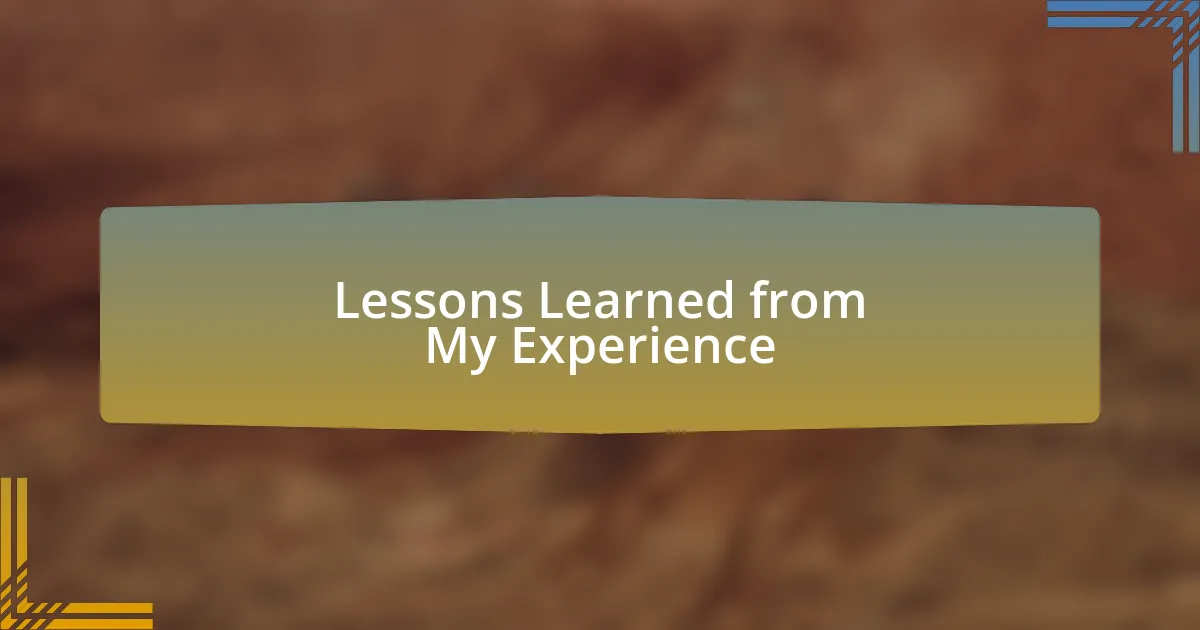
Lessons Learned from My Experience
Throughout my journey, I’ve come to realize that true success in mining investment isn’t just about the numbers; it’s about transformation. I recall a project where we involved local artisans in our operations, integrating their skills into our supply chain. This experience taught me that when we leverage local talent, we not only create employment but also build mutual respect—something that is priceless in strengthening community relations.
One of the toughest lessons I faced was when I overlooked the importance of cultural sensitivity. In one instance, a decision made purely on financial grounds sparked backlash from the local community. It made me reflect: how could I prioritize profit if it meant undermining trust? That moment solidified my belief that listening to and valuing local perspectives can significantly enhance our investment outcomes.
I’ve also learned that collaboration can be a game-changer. I remember negotiating with a mining firm that was resistant to adopting sustainable practices. Instead of walking away, I engaged them in discussions about the long-term benefits of responsible mining. To my surprise, not only did they change their approach, but it sparked a wider conversation about shared responsibility in the industry. Have you ever seen how one small shift can create ripples of positive change? It’s these experiences that motivate me to continue advocating for responsibility in mining investments.